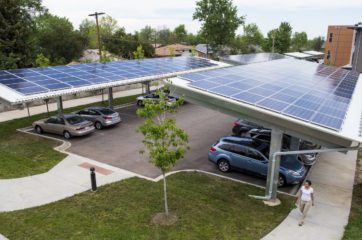The newly created Wisconsin Office of Sustainability and Clean Energy and associated Climate Change Task Force are working to establish climate policy and promote state level change. Since COVID-19 spread across the country, public comments and listening sessions have gone virtual with the widely used Zoom interface, allowing representatives and constituents from all across the state to provide insights and direction on the future of climate change mitigation policy.
As the state continues to battle concerns surrounding COVID-19, Lt. Governor Mandela Barnes was quick to draw a parallel as he commenced the May 21st task force meeting, stating, “climate change was here before the pandemic, it’ll be here after and there are ways that these two are connected.” The COVID-19 pandemic has been the epicenter of political discussion as Wisconsin debates on reopening strategies to best combat viral transmission, but the pandemic has not deterred from the Governor’s progressive climate action plan.
How Did We Get Here
Acting on his campaign promise to address climate change in Wisconsin, Governor Tony Evers signed multiple executive orders in 2019 to push for state level climate action. The signing of Executive Order #38 created the Office of Sustainability and Clean Energy, while establishing an ambitious goal for state electricity consumption to be carbon-free by 2050.
Ever’s Executive Order #52 established the Governor’s Task Force on Climate Change, housed under the Office of Sustainability and Clean Energy, designed to advise and assist the governor in developing strategies to protect Wisconsin communities for the adverse impacts of climate change. The task force was initially slated to present recommendations to the Governor’s office in August of 2020, but this date has since been pushed back to October 31st, 2020 due to pandemic related disruptions.
Since its inception, the Lt. Governor has been working diligently to compile a diverse and educated task force, designed to represent all the stakeholders potentially impacted by a changing and warming climate. Composed of agency heads, state legislators, nonprofit representatives, academics, tribal leaders and utility investors, the task force was selected by the Governor to actively take into consideration interests from across different industries and community members.
The task force convened for a preliminary meeting in December and has been regularly meeting in three independent subcommittees throughout the duration of the spring and early summer.
A Closer Look at the Task Force Subcommittees
The three subcommittees represent (1) healthy communities and economic interests, (2) energy, housing and infrastructure, and (3) land use and conservation. They have been meeting to establish task force responsibilities, and each subcommittee has made immense progress to adequately address concerns for their assigned sectors.
1. Healthy Communities and Economics Subcommittee
Home to approximately six million residents, Wisconsin attracts a diverse array of business opportunities both in growing urban centers and surrounding areas. A primary concern of the task force is addressed by the Healthy Communities and Economics Subcommittee, which seeks to promote climate change outcomes relating to public health and environmental justice, while securing jobs and a growing economic sector. The subcommittee will focus on providing recommendations specific to the topics of climate justice and equity, resilient systems, and a healthy green economy. Subcommittee head Kristofer Canto affirmed that the subcommittee will “engage a whole host of partners across the state [with] expertise in all different areas,” while, “leveraging folks at the urban and rural level to better understand the uniqueness of each community’s situation.”
2. Energy, Housing and Infrastructure Subcommittee
In accordance with its growing population, the need for efficient energy buildings and redesign of current structures is a growing concern for Wisconsin climate change advocates. The subcommittee for Energy, Housing and Infrastructure, headed by Jeffrey Crawford is set to build on the information proposed during Governor Jim Doyle’s 2008 Task Force on Global Warming. Subcommittee members have reviewed current literature relating to housing and infrastructure concerns and how these structures may be compromised by climate change. The subcommittee is set to focus on updating state level building codes to comply with the international stands for energy efficiency, while evaluating economic incentives and financing concerns surrounding the growing green energy market.
3. Land Use and Conservation Subcommittee
Wisconsin, a state heavily reliant on the agricultural economy and land usage, stands to lose vital commodities as the climate crisis continues to accelerate. Known as America’s Dairyland, Wisconsin is home to 23% of the nation’s dairy farms, accounting for 14% of U.S. milk production and boasting a 1.8 billion dollar cattle industry. The dominant agricultural industry contributes 16.4% to the states total industrial revenue and provides nearly 12% of jobs. Farmers depend on climate consistency and are continuing to fight an uphill battle to build climate resilience into their agricultural practice.
The current predictions cite drastic changes in precipitation and a shift in the prime agricultural growing season, posing a major threat to the livelihoods of many Wisconsinites. The Land Use and Conservation Subcommittee, headed by Bill Hogseth, conducted community level research to directly engage primary stakeholders. Hogseth cited that these conversations are “helping us craft our recommendations with an eye towards equity and making sure those voices are a part of the conversation.” This also ensures that they “are not operating in a bubble,” as recommendations are being made. The subcommittee holds a primary focus on protecting agricultural lands and instituting projects that both mitigate climate change and induce positive economic growth for farming communities. An additional focus is placed on ensuring food system resiliency in response to shifting temperatures, and variable flooding patterns, as food demand and production continues to grow.
This information and associated recommendations, from all subcommittees, will be synthesized in the final recommendations to Governor Evers delivered by the new October 31st deadline.
Looking Ahead
While the recommendations deadline has been delayed till the fall, the use of virtual meetings has not only ensured the safety of all committee members, but provided greater public involvement from community members across the state. The task force continues to make marked progress on a variety of climate issues central to community health, agricultural development and environmental justice in addition to implementing plans to decrease carbon emissions. Task force members have not let the pandemic stand in the way of tackling the climate crisis, and are set to work until the dairy cows come home to ensure all sides of the issues are addressed.
The next virtual listening session will take place on Tuesday, July 7th from 6:00 to 8:00 pm and is open to the public. A full listing of virtual listening sessions along with detailed minutes from previous meetings are available here.









